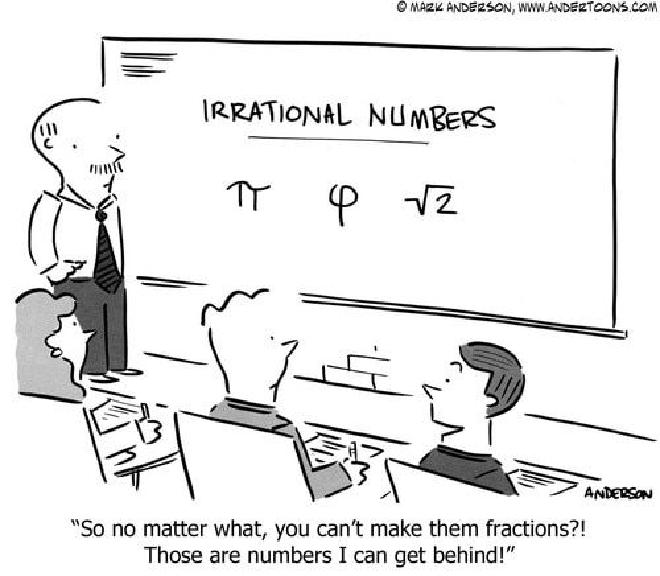Why Are Irrational Numbers Termed as Irrational?
Table of Contents

What is an Irrational number? #
It would be irrational to speak of irrational numbers without describing the history of why they got the name. Back in the days of Pythagoras, his contemporaries and predecessors, the philosophers and the people held a belief that the natural numbers and the fractions are the work of God and are by nature divine. All fractions either terminate in decimals or recur infinitely with the same pattern of numbers. But when they(the philosophers, in those days there was no distinction between mathematicians, physicists, biologists and philosophers, this distinction came around the same time when the Royal Academy started in England, by the founding members and the source of inspiration) encountered the length of the unit square(which is supposed to be divine since it’s sides are of length 1, a divine number) has the length of diagonal “unfractionated” I.e, they cannot be made into fractions with integers. It just annoyed people back then that they can’t tame the numbers after the decimals, it just keeps popping up in random(?).
This irrational behaviour fetched its name irrational numbers for the same. Contemporary Philosophers are still struggling to define rationality and irrationality on different bases but those around the time of Pythagoras were well enough to define the irrationality of these irrational numbers. Sounds sweet to me. But we have something here to look into. The name given is the negation of the fact of something being rational. So, is there a definition/name for irrational numbers which is not a negation of rational?
Continued #
The contemporaries of the Pythagoras are subjected to gallows and other severe punishments if they worked or talked about the irrational numbers. Sounds like they tag a person irrational if he works with irrational numbers. What a way to define irrationality!
Even with such fanatic laws and restrictions, philosophers couldn’t sleep bearing the fact that irrational numbers exist. Hence, they took efforts to rationalise the irrational.
Efforts #
Look at the example below:

Here, \(\sqrt{2}\) can be defined as a solution of the polynomial \( p(x) = x^2 - 2\) at \(p(x) = 0\). Notice, that the coefficients of the polynomial are all rational numbers(integers in this example). This is one idea that people came up with to give a concession and rationalise the irrational behaviour(or tame the untameable numbers). There are many more examples like the sum of infinite series, the sum of infinite fractions, recurrence computations etc.
But all these efforts are gone in vain when people encountered the two irrationals who are strong enough to not let themselves be tamed by these feeble attempts. The \(\pi\) and the \(e\). There are some complicated formulas to generate the value of \(\pi\) and \(e\) using integers but they resisted the movement – so to say.
These numbers who resisted those feeble attempts are called transcendental numbers (or numbers of another world). Even the golden ratio is tamed easily by the sort of polynomial \(p(x) = x^2 -x -1\) at \(p(x) = 0\). But \(\pi\) and \(e\) are different.
Conclusion #
The tamed irrational are called real algebraic and the other set of irrational numbers that are not algebraic are called transcendental numbers. This distinction and analysis may not be great but has its own lessons and inspirations for a lot of future work.
